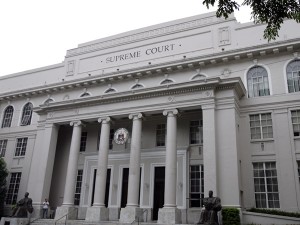SC asked to extend restraining order on cyber law
MANILA, Philippines—Petitioners against Republic Act 10175 or the Cybercrime Prevention Act of 2012 asked the Supreme Court to extend the 120-day restraining order it issued against the implementation of the law.
The restraining order will lapse on February 5.
“We will take up the request in future en banc (full court) sessions,” Chief Justice Maria Lourdes Sereno said.
The restraining order was issued on Oct. 5, 2012 after the high court was swamped with 15 petitions from various groups asking that provisions or the entire law be declared as unconstitutional.
During Tuesday’s oral argument, Associate Justice Diosdado Peralta said Section 19 of the law which provides that “when a computer data is prima facie found to be in violation of the provisions of [RA 10175], the DOJ shall issue an order to restrict or block access to such computer data” can be considered an equivalent to a search warrant.
Associate Justice Teresita Leonardo De Castro meanwhile said before there can be finding of possible violation, there has to be an investigation or “snooping around” but the law is not specific.
“Section 19 is not specific on how prima facie findings will come about,” she said.
“All we are asking is that there should be judicial intervention,” lawyer Rodel Cruz told the high court.
On Section 12 of the law which provides for real time data collection of authorities, Justice De Castro said the law is vague for it did not identify who can be subjected to such data gathering.
“In terms of coverage, who are covered? It can be anyone, a group, it doesn’t say also…So it can be upon the discretion of the law enforcement. Is there anything under the law that can restrict the power of authorities to collect data?” de Castro asked.
Lawyer Jesus Disini Jr. said there is none.
“If you allow authorities to gather traffic data, can ordinary citizen know they are only collecting traffic data? How can people be assured,” De Castro asked.
Disini said the law does not provide for any assurance. He said the road power given to authorities can be dangerous as he cited the case of former CIA Director and retired four-star general David Petraeus who resigned after his extramarital affairs was discovered.
Disini said the Petraeus case started with a cyberstalking complaint that prompted the FBI to gather electronic data that eventually led to the discovery of the affair.
Next week, it will be the government’s turn through Solicitor General Francis Jardeleza to argue and insist on the constitutionality of the cybercrime law.
